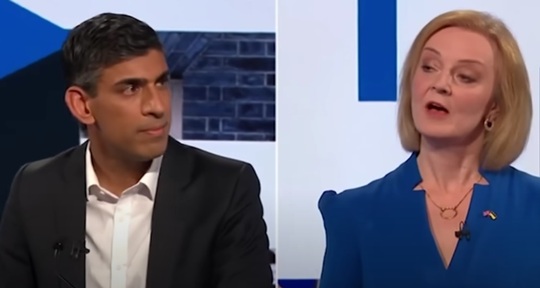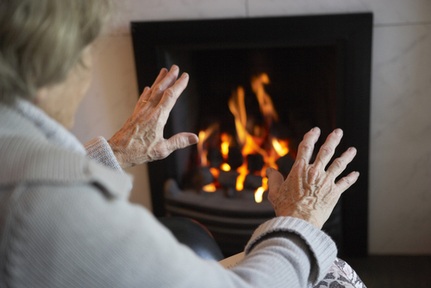Pensioners reduced to wartime-like rationing beg Liz Truss and Rishi Sunak to end cost-of-living crisis
Britain’s elderly are appealing to PM candidates Liz Truss and Rishi Sunak to fix the cost-of-living crisis, which is making some fear they’ll have to ration like they did in WW2.

A poll of 14,021 people aged 65+ has revealed that more than half (57 per cent) want Conservative leadership candidates Ms Truss and Mr Sunak to help with the cost-of-living crisis and restore the ‘triple lock’ for pensions from April 2023, as well as tackle social care (25 per cent).
Older people are struggling ‘to feed ourselves’
Energy bills for a typical household could hit £4,266 next year, consultancy Cornwall Insight has warned. This equates to 45 per cent of the current state pension. On average, pensioners receive less than £9,000 a year from their state pension. Due to the suspension of the triple lock in April 2022, the state pension rose by just 3.1 per cent this year, while consumer prices are soaring as inflation hit a 40-year-high of 10.1 per cent in July.
One pensioner responding to the Age UK poll, said: “Older people are not all wealthy and some of us are struggling to keep up with bills as well as feed ourselves. “This is almost like going back to January 1940 for some of us when rationing was introduced during WW2”.
Risk of ‘older people dying of cold in their own homes’
Ms Abrahams has written open letters to Mr Sunak and Ms Truss on behalf of pensioners, asking them to publicly state they will tackle social care funding and workforce shortfalls, restore the pension ‘triple lock’ and commit to improving household energy efficiency and give emergency support for energy bills to help pensioners stay warm this winter.
Experts say they expect 8.2m UK households to be in fuel poverty from this October. This means that an older person who is living in one of the least energy efficient homes (EPC bands D-G), which often have inadequate loft or wall insulation, will pay around £1,000 more on their annual energy bill than if they were living in more fuel-efficient homes.
Age UK’s charity director Caroline Abrahams has warned that without a “big injection” of extra financial support from the government to help see older people through the autumn and winter: “We could see unprecedented numbers of older people dying of cold in their own homes, something we would never say lightly and that is incredibly shocking in the twenty first century.”
The charity director argues older people on low fixed incomes cannot possibly afford to upgrade their insulation and heating systems to make them more energy efficient but if all homes below EPC band C were improved the aggregate annual energy bill saving would be well in excess of £10bn. The Bank of England has warned high prices will push the UK into recession, with the economy forecast to shrink in October, November and December 2022 and continue to do so until December 2023.
Pensioner fears choice ‘between food and heating’

Caroline Abrahams, charity director at Age UK, said: "The way the cost of living keeps rising is a nightmare for us all, but especially for people on low incomes, among them millions of pensioners.
“Every day the news about inflation seems to get worse, it’s no wonder some older people have told us they have switched off the news because they can’t bear to hear any more."
The charity is urging the government to keep its promise to reinstate the triple lock from April 2023. In a letter to Rishi Sunak on 15 August, Ms Abrahams wrote: ‘We were delighted when you committed as Chancellor to restoring the ‘triple lock’ next year, but it would give older people great reassurance to hear you say this in public now, in your role as a candidate for the leadership of the Conservative party and our next Prime Minister.”
One pensioner, responding to the Age UK poll, said: “Heating and food are my main concern.
“At present I am cutting back on food, buying cheaper brands, not buying clothes just so I can put enough by to pay for oil and electric. Only use my car when I really have to. So we definitely need the triple lock in place otherwise we will have to choose between food or heating. Cut back on everything else so there’s nowhere else to go.”
‘Chronic shortage of home care’
A survey by the Association of Directors of Adult Social Care (ADASS) found that by the end of April 2022, more than half a million people were waiting for care assessments, Direct Payments, or care reviews – and many of them were older people.
The charity director said the “chronic shortage of home care is crippling patient flow in many hospitals up and down the land. Tragically, some people have waited up to nine months to be discharged from some trusts as a result.”
With lots of older people stuck in hospital beds when medically fit to go home, the charity director says many are “losing physical capacity and becoming frustrated and despondent as their lives are put on hold. It’s an utterly miserable situation for everyone”.
Another pensioner responding to the charity’s poll said: “One of the biggest worries is having to pay for care, either in a home or at home, you do the best you can.
“Recently my husband came out of hospital at 9pm. No-one asked if I could manage at 87 or did we need assistance. I did manage but it is becoming more and more difficult, particularly when family live miles away. I pay for cleaning but there is much more to do than just this. We are the forgotten group.”
In a letter sent to Liz Truss on 15 August, Caroline Abrahams wrote: ‘It is imperative that the next Government takes swift action to tackle the shortfalls in funding and personnel undermining both the NHS and social care as well as implementing the planned social care cap. We call on you to demonstrate during your campaign that you recognise the gravity of these issues, and your commitment to act if you become Prime Minister.”
Former Chancellor Mr Sunak has promised to reduce VAT on domestic energy bills from 5 per cent to zero. Former foreign secretary Ms Truss has pledged to scrap April's National Insurance rise to help households.
A 90-year-old RAF veteran bluntly said in his survey response: “For many it is eat or heat. I served 22 years in the RAF and this has been followed by 50 years in the Royal British Legion. I am seeing my members having little or no one listening to their problems i.e. finance, pensions, health queues, loneliness and above all, having a voice in today's world.”
Latest News
 29-Jul-24
Dementia Bus gives carehome.co.uk staff insight into life with dementia
29-Jul-24
Dementia Bus gives carehome.co.uk staff insight into life with dementia
 27-Jul-23
UK's top home care agencies in 2023 revealed
27-Jul-23
UK's top home care agencies in 2023 revealed
 30-Nov-22
A quarter of older people keep their falls secret from family
30-Nov-22
A quarter of older people keep their falls secret from family
 29-Nov-22
'Covid-19 has not gone away' say terminally ill
29-Nov-22
'Covid-19 has not gone away' say terminally ill
 28-Nov-22
IT consultant who received poor care opens 'compassionate' home care business
28-Nov-22
IT consultant who received poor care opens 'compassionate' home care business